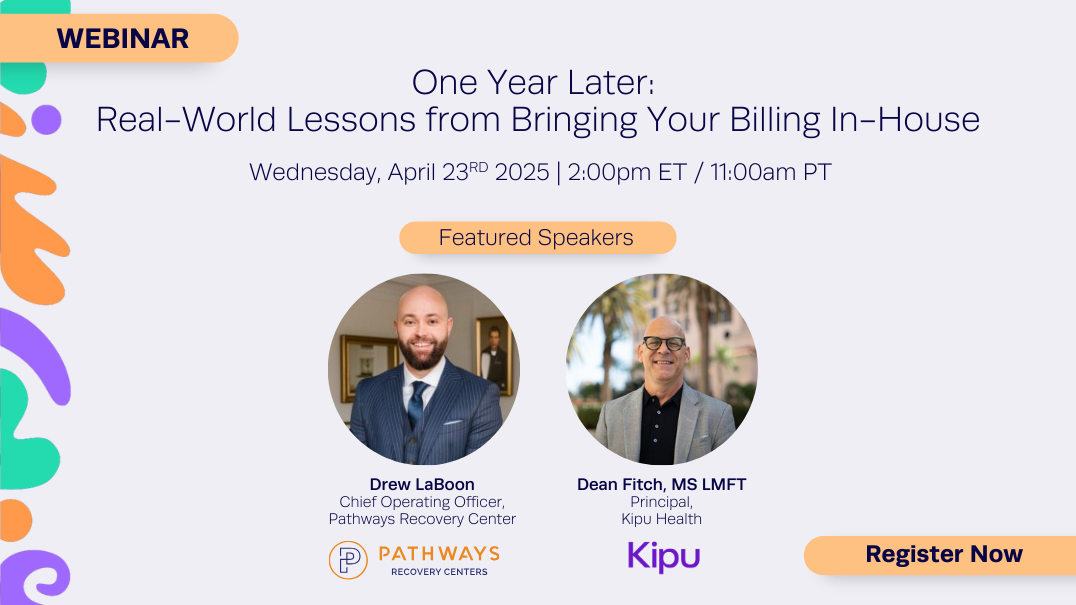Reflecting on 2024: Navigating Challenges and Seizing Opportunities in Behavioral Health

As 2024 draws to a close, I’ve been looking back on the setbacks and successes I’ve heard about from leaders like you. The thing that stands out most to me is the adaptability to shifting regulations, emerging technologies, and evolving patient needs that reflect the flexibility and resilience of the behavioral health community.
Throughout the year, leaders faced a complex mix of challenges—from regulatory shifts to technological advancements—all while striving to provide compassionate, high-quality care. Kipu Health has been at the forefront of these conversations, offering insights and tools to help treatment centers thrive. I’ve distilled the trends and lessons from our customers to help you build a roadmap for continued success in 2025.
Financial Sustainability: Strengthening Revenue Cycle Management
This year, one of the most pressing issues I heard from many of you was the need to ensure financial stability amidst growing demands. The emphasis on revenue cycle management (RCM) was more crucial than ever. Financial sustainability is not just about keeping the lights on—it’s about creating an environment where care teams can focus on what matters most: the patient.
We saw that facilities focusing on metrics like clean claim rates, denial rates, and days in accounts receivable were the ones that could better identify inefficiencies and improve cash flow. Pathways Recovery Centers, for example, showed us that bringing billing in-house wasn’t just an operational move—it became a cultural shift that improved both their financial health and their ability to provide care. Financial stability and patient outcomes are inextricably linked, and we need to continue that work into 2025.
Compliance and Trust: Turning Risk Management into Opportunity
The regulatory landscape continues to evolve, and keeping up is no small task. But what I’ve observed this year is that the most successful organizations don’t just comply—they see compliance as an opportunity to build trust and enhance quality. Whether it was meeting new HIPAA requirements or adjusting to ASAM 4, those who leaned into proactive compliance measures found themselves not only avoiding penalties but strengthening their reputation and patient relationships.
Regular audits, staff training, and robust data protection aren’t just boxes to check—they’re the foundation of a safe and trusted environment for those we serve. Leaders who adopted a forward-looking view of compliance positioned themselves better for audits and leveraged these changes to continuously improve the quality of care.
Technology: A Catalyst for Transformative Care
2024 was also a year of technological transformation. We’re not just talking about new gadgets or systems—we’re talking about technology that fundamentally changes the way we approach care. Advances in electronic medical record (EMR) systems, artificial intelligence (AI), and patient engagement tools were game changers.
For example, the behavioral health group we featured that used AI to streamline admissions and scheduling wasn’t just saving time—they were freeing up clinicians to spend more meaningful moments with patients. And, we were excited to announce the launch of our own AI solution, KIP, in collaboration with Amazon Web Services. Our early access partners have begun to share feedback, telling us that implementing Kipu Intelligence Program (KIP) features, they’ve experienced a reduction in time spent on documentation, allowing their clinicians to focus more on patient care. Its seamless integration within the EMR puts informed clinical decision-making and increased efficiency at our fingertips.
The conversation around EHR versus EMR wasn’t just about semantics; it was about making strategic choices that align with a facility’s mission for patient-centered care. Technology is only as powerful as the strategy behind it, and this year showed us the importance of thoughtful implementation.
Patient-Centered Innovations: Bringing Care Closer to Home
If there’s one thing that stayed constant this year, it’s that the patient has to be at the center of everything we do. The facilities that embraced innovative tools—whether for telehealth, specialized treatment programs, or real-time communication—were the ones that saw the biggest impact on patient satisfaction and outcomes.
I heard stories of how digital portals and tailored care plans helped patients feel more connected and empowered in their treatment journeys. It’s about meeting patients where they are, and giving them the tools to be active participants in their recovery. This human-centered approach isn’t just the future of behavioral health—it’s the present, and it’s making a real difference.
Stories of Resilience: Learning from Each Other
The most inspiring part of 2024 for me has been hearing your stories—stories of growth, adaptation, and resilience. Forge Health cut their intake-to-admission time by 50%, not just by changing a process, but by changing how they thought about patient flow. OneFifteen’s decision to integrate Kipu’s EMR and billing solutions was about more than technology—it was about advancing their entire approach to care.
We also tackled some of the industry’s toughest questions, from the ongoing overdose crisis to the ethical considerations of AI in healthcare. The collaboration and thought leadership I witnessed through webinars and discussions were nothing short of inspiring. Behavioral health is not an easy field, but it’s one filled with people who care deeply and are willing to innovate for the sake of their communities.
Looking Ahead: Our Path for 2025
As we prepare for 2025, let’s take these lessons to heart:
- Embrace Financial Visibility: Let’s continue to strengthen our revenue cycles with transparency and proactive management.
- View Compliance as a Trust-Building Tool: Regulations are opportunities to build patient trust and improve quality.
- Leverage Technology for Meaningful Change: Choose tools that enhance care and reduce administrative burdens.
- Keep the Patient at the Center: Every innovation should bring us closer to understanding and empowering those we serve.
Behavioral health is on the cusp of even greater transformation. By learning from each other and remaining steadfast in our commitment to compassionate care, we can ensure that 2025 is a year of growth, resilience, and meaningful impact.
I’m looking forward to a future of innovation, collaboration, and, most importantly, compassionate care.
Recent Posts
Rely on Kipu to keep you ahead of change.
Subscribe to Kipu for behavioral health news, updates, community celebration, and product announcements.




